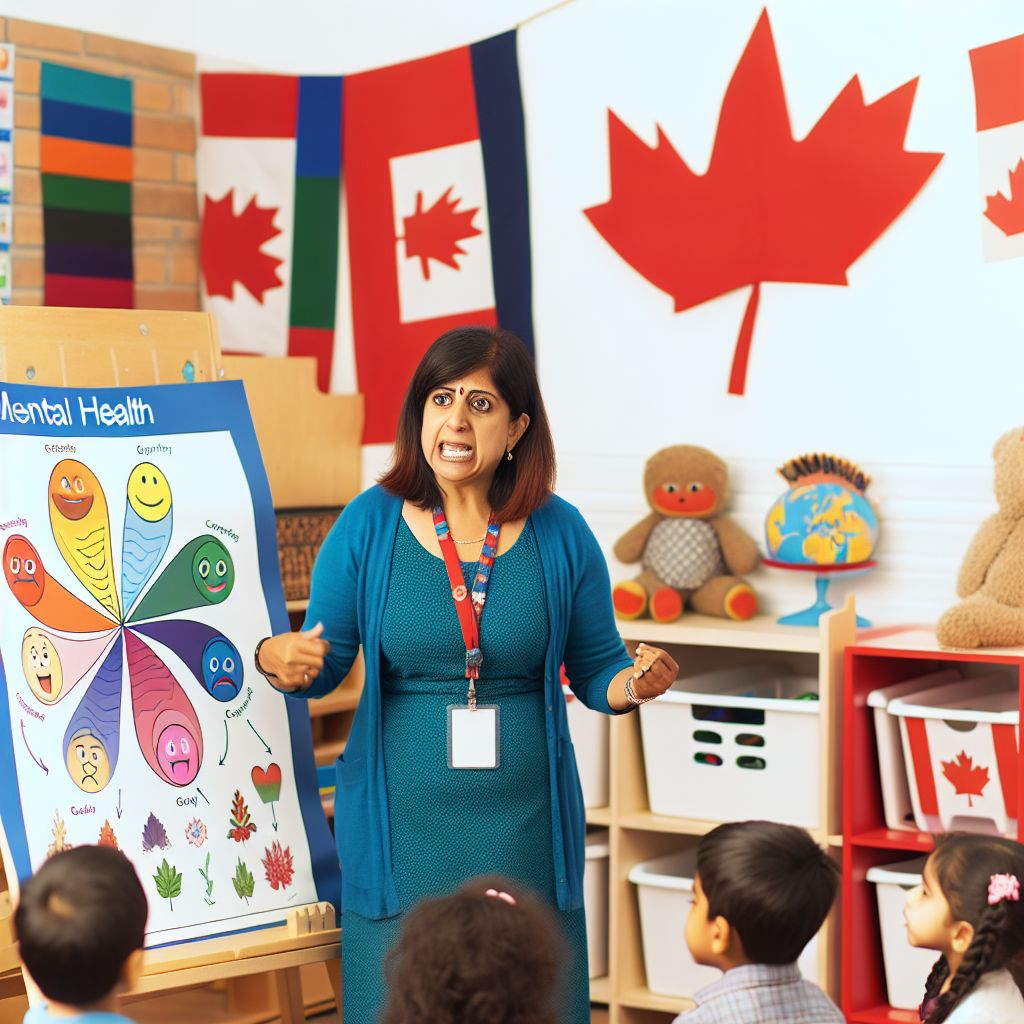The Importance of Early Childhood Education in Mental Health
Creating a Strong Foundation
Early childhood education lays a vital foundation for lifelong learning.
At this stage, children’s brains develop rapidly and are highly receptive.
Research shows that positive experiences foster healthy brain development.
Consequently, a nurturing educational environment enhances cognitive skills.
Moreover, it promotes emotional and social skills essential for mental health.
Building Emotional Resilience
Early education helps children develop emotional resilience.
Children learn to identify and manage their feelings effectively.
Such skills are crucial for coping with stress and adversity.
Additionally, supportive relationships in early settings build confidence.
This confidence translates to better emotional regulation in later years.
Enhancing Social Skills
Social interaction in educational settings aids in skill development.
Children learn to work collaboratively and practice empathy.
These experiences are foundational for healthy relationships in adulthood.
Furthermore, social skills are closely linked to positive mental health.
Identifying and Addressing Challenges
Early childhood education provides opportunities for observation.
Educators can identify potential mental health challenges early.
This early detection is essential for timely intervention and support.
By working with families, educators can connect children with resources.
Ultimately, this collaboration fosters a supportive network for children.
Collaborative Efforts with Families
Engaging families in the educational process is crucial.
Parents play an essential role in reinforcing learned skills at home.
Open communication helps to align educational and home practices.
Moreover, providing resources empowers families to support their children.
As a result, children feel more secure and valued, promoting mental well-being.
Understanding the Connection Between Childhood Experiences and Mental Well-being
The Importance of Early Experiences
Early childhood experiences significantly shape a child’s mental health.
Unlock Your Career Potential
Visualize a clear path to success with our tailored Career Consulting service. Personalized insights in just 1-3 days.
Get StartedThese formative years lay the groundwork for future emotional responses.
Positive interactions foster resilience in children.
Conversely, negative experiences can lead to mental health challenges.
Influence of Parenting Styles
Parenting styles play a crucial role in child development.
Authoritative parenting encourages open communication and support.
This approach promotes healthy self-esteem and emotional regulation.
On the other hand, neglectful or authoritarian parenting may hinder emotional growth.
Role of Education in Mental Health
Early childhood education contributes to emotional well-being.
Quality programs provide children with social interactions.
These interactions help develop essential social skills.
Additionally, teachers can identify early signs of mental health issues.
Building a Supportive Environment
A supportive environment enhances a child’s mental health.
Safe spaces encourage children to express themselves freely.
Support from caregivers can significantly bolster emotional security.
Thus, fostering a positive atmosphere is vital for mental well-being.
Understanding the Signs of Distress
Recognizing signs of emotional distress is essential.
Children may express their feelings through behavior changes.
Common signs include withdrawal, aggression, or changes in sleep patterns.
Early intervention can prevent long-term mental health issues.
The Importance of Community Support
Community resources play a valuable role in mental health awareness.
Support groups provide parents with guidance and resources.
Collaboration between educators and mental health professionals is crucial.
This partnership enhances the educational experience for all children.
Role of Educators in Promoting Mental Health Awareness
Building a Supportive Environment
Educators play a crucial role in fostering a supportive atmosphere.
They create safe spaces where children can express feelings.
This openness encourages positive interactions among peers.
Additionally, a nurturing environment helps alleviate anxiety.
Identifying Early Signs of Mental Health Issues
Early detection of mental health challenges is vital.
Educators should be observant of behavioral changes.
They can note signs of distress, such as withdrawal or aggression.
Addressing these issues promptly can lead to better outcomes.
Incorporating Mental Health Education in the Curriculum
Including mental health topics in the curriculum is essential.
Educators should teach children about emotions and coping strategies.
Games and activities can facilitate learning about mental wellness.
Moreover, integrating social-emotional learning benefits all students.
Collaborating with Parents and Caregivers
Strong partnerships with families enhance mental health support.
Educators can share resources and strategies with parents.
Regular communication fosters trust and understanding.
This collaboration creates a consistent approach to mental health.
Training and Professional Development
Ongoing training prepares educators to address mental health effectively.
Workshops can equip them with the necessary skills and knowledge.
Furthermore, professional development emphasizes the importance of mental health.
Regular updates ensure educators are aware of current best practices.
Discover More: Essential Certifications for Canadian Early Childhood Educators
Creating a Supportive Classroom Environment for Mental Health
Establishing Trust and Safety
Children thrive in environments where they feel safe and trusted.
Start by building positive relationships with your students.
Engage in active listening to show that you value their feelings.
Create a routine that offers structure and predictability.
Establish clear and consistent classroom rules that promote respect.
Encouraging Open Communication
Encourage children to express their thoughts and emotions freely.
Provide a welcoming space for sharing, both verbally and non-verbally.
Incorporate activities that foster emotional awareness among students.
Use storytelling to help children articulate their feelings.
Model appropriate communication skills to guide children.
Integrating Mental Health Education
Include mental health topics within the curriculum.
Teach coping strategies and emotional regulation skills.
Use age-appropriate resources to discuss mental well-being.
Incorporate mindfulness practices into daily activities.
Invite guest speakers, such as counselors, to share insights.
Encouraging Social Connections
Facilitate group activities to build teamwork and friendships.
Encourage peer support and collaboration in projects.
Promote inclusive practices to ensure everyone feels valued.
Recognize and celebrate individual and group achievements.
Provide opportunities for conflict resolution and discussion.
Creating a Positive Physical Environment
Design a classroom layout that promotes interaction and engagement.
Incorporate calming colors and decorations to create a soothing atmosphere.
Ensure that materials are accessible and varied to support exploration.
Include designated quiet spaces for students needing solitude.
Use nature and outdoor spaces to enhance learning experiences.
Explore Further: Essential Tools for Modern Corporate Trainers in Canada
Recognizing Signs of Mental Health Issues in Young Children
Understanding Developmental Milestones
Young children reach various developmental milestones at different ages.
These milestones include physical, emotional, and social skills.
Parents and educators must monitor progress to identify unusual patterns.
Behavioral Changes to Watch For
Behavioral changes can signal mental health issues in young children.
Look for signs of excessive crying or frustration, which may indicate distress.
Increased withdrawal from activities or peers can also be a concern.
Furthermore, noticeable changes in appetite or sleep patterns merit attention.
Emotional Signals
Emotional signals often reveal a child’s inner state.
Children may express sadness or anxiety through their play and interactions.
Pay attention to frequent mood swings, as these may signify deeper issues.
Additionally, a lack of joy in previously enjoyed activities is telling.
Social Interaction Indicators
Social behaviors are critical in recognizing mental health issues.
Difficulty forming friendships can indicate underlying emotional problems.
Moreover, aggressive or disruptive behavior can reflect distress in children.
Observing how they react to conflict also provides insight into their mental health.
Physical Symptoms to Consider
Physical symptoms may accompany mental health issues in young children.
Frequent complaints of stomachaches or headaches can be a red flag.
Additionally, regression to earlier behaviors, like bedwetting, should be noted.
Always consider these physical complaints in context with emotional changes.
Importance of Open Communication
Encouraging open communication helps children express their feelings.
Talk to them about their emotions and experiences regularly.
Creating a safe space for dialogue fosters trust and understanding.
Moreover, this practice helps in early identification of potential issues.
Seeking Professional Guidance
If you observe concerning signs, consult a pediatric professional.
Early interventions can significantly enhance a child’s well-being.
Moreover, getting support for parents is equally important.
Professional guidance can help navigate complex emotions and behaviors.
Discover More: Curriculum Developers in Canada’s Education Industry

Strategies for Integrating Mental Health Education into Early Childhood Curriculum
Creating a Supportive Environment
A supportive environment fosters mental health awareness among young children.
Teachers should model positive behaviors and encourage open communication.
This creates a safe space for children to express their feelings.
Incorporating calming areas in classrooms can also help minimize anxiety.
Additionally, providing resources, such as books about emotions, can be beneficial.
Incorporating Mindfulness Practices
Mindfulness practices can enhance children’s emotional regulation skills.
Daily routines should include short mindfulness exercises.
Examples include deep breathing and guided imagery.
These practices help children remain present and focused.
Moreover, incorporating movement activities like yoga can be beneficial.
Engaging Families
Engaging families is crucial for reinforcing mental health education.
Schools should provide workshops for parents on mental health awareness.
These workshops can offer strategies to support children’s emotional well-being.
Furthermore, sending home resources and activities can keep families involved.
Encouraging open dialogues about emotions within families strengthens support.
Integrating Play-Based Learning
Play-based learning effectively promotes mental health awareness.
Children learn about emotions and social interactions through play.
Structured play activities should include teamwork and empathy-building tasks.
Using role-playing scenarios can help children navigate complex emotions.
Moreover, allowing free play encourages exploration and self-expression.
Educator Training and Resources
Providing training for educators enhances their ability to support mental health.
Workshops should focus on recognizing signs of mental health issues.
Moreover, training on communication skills can empower teachers.
Schools should offer ongoing support and resources for staff development.
This ensures educators remain informed about the latest mental health strategies.
You Might Also Like: How Career Coaches Support Professional Growth in Canada
Collaboration Between Families and Schools to Support Children’s Mental Health
The Importance of Partnership
Families and schools play a vital role in children’s mental health.
By collaborating, they create supportive environments for children.
This partnership fosters communication between parents and educators.
As a result, kids feel more understood and secure.
Building Trust and Open Communication
Effective collaboration starts with building trust.
Parents should feel comfortable sharing concerns with teachers.
Moreover, educators must be open to family input.
Regular meetings can enhance this communication.
In addition, newsletters can keep families informed about school activities.
Sharing Resources and Training
Schools can provide resources for families to access mental health support.
Workshops can educate families on identifying mental health issues.
In turn, this knowledge empowers parents to help their children.
Similarly, schools should receive training in mental health awareness.
Such training can equip teachers with essential skills.
Encouraging Holistic Approaches
Holistic approaches consider the whole child in mental health discussions.
Schools and families can work together on social-emotional learning programs.
This integration nurtures emotional intelligence in children.
Furthermore, it helps them develop resilience and coping strategies.
Engaging Community Resources
Collaboration doesn’t end within schools and families.
Community resources can enhance support systems for mental health.
Schools can partner with local mental health organizations.
These partnerships can lead to workshops and counseling services.
Moreover, engaging with community can reduce stigma around mental health.
Resources and Tools for Early Childhood Educators to Address Mental Health
Supportive Training Programs
Training programs empower educators with essential skills.
These programs focus on recognizing mental health challenges.
In addition, they provide strategies for effective interventions.
Organizations like the National Association for the Education of Young Children offer resources.
Consider attending workshops offered by Child Care Aware.
Collaborative Community Initiatives
Engaging with local mental health services is vital.
These services can provide guidance and support for educators.
Furthermore, partnerships with schools enhance the mental health framework.
Explore community resources through the Substance Abuse and Mental Health Services Administration.
Networking with local professionals enriches knowledge sharing.
Implementation of Mindfulness Practices
Mindfulness practices can significantly benefit young children.
Teaching mindfulness helps improve emotional regulation.
Additionally, it reduces stress and anxiety among students.
Educators can integrate simple techniques like breathing exercises.
Resources such as Mind Up offer structured mindfulness programs.
Accessible Reference Materials
Reference materials assist educators in their daily practices.
Books like “The Whole-Brain Child” provide valuable insights.
Online platforms like Zero to Three offer articles on child development.
Consider using visual aids that explain mental health concepts.
Finally, develop a library of resources for continuous learning.
Parental Involvement and Education
Educating parents about mental health is crucial.
Offer workshops to enhance parents’ understanding of child behavior.
Additionally, encourage discussions on emotional well-being at home.
Provide parents with handouts that cover important topics.
Engage them through newsletters with updates and resources.
Additional Resources
Social Determinant of Health: Education Is Crucial
Research about mental health, Mental Health Education, Awareness …




